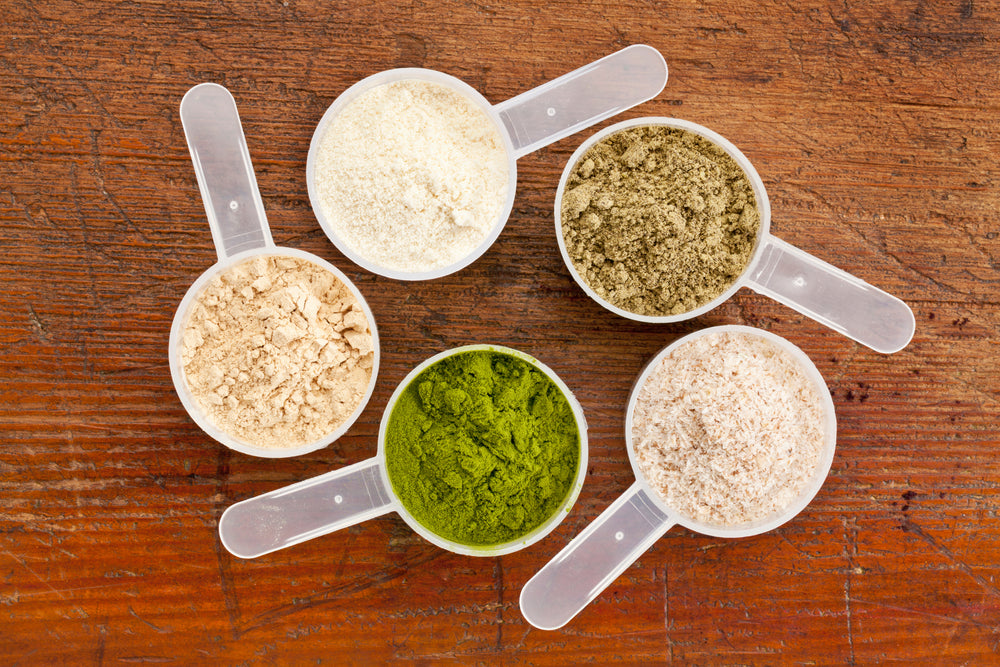
Plant vs. Whey Protein: Which Is Right for You?
Protein is an essential nutrient for our bodies. In fact, it plays a number of important roles: repairing muscles, maintaining bone health, supporting weight loss, boosting the immune system, regulating hormones and enzymes, and improving heart health. However, getting enough protein is the first step to reaping these health benefits.
Often, people will turn to protein powders to ensure they’re reaching their daily recommended intake. But which kind of protein should you choose: is whey or plant protein better?
Plant-based proteins and whey proteins are two of the most popular options on the market. To help you determine the most compatible product for your wellness goals, we’re breaking down everything you need to know about the plant vs. whey protein debate.
Jump straight to:
- What Is Whey Protein
- What Is Plant Protein
- Whey vs. Plant Protein
- Best Source of Plant-Based Protein
What Is Whey Protein?
Whey protein is made from milk during the cheese-making process. Here’s how:
- Cheesemakers add enzymes to milk to catalyze a chemical reaction.
- This chemical reaction produces curds (solids) and whey (a liquid).
- The curds are drained and used to make cheese, while the liquid whey is reserved for other products—like whey protein powders.
Whey protein is highly popular for many reasons. Let’s take a look at a few below.
Nutritional Breakdown
Proteins are made of chains of amino acids—often called “the building blocks of life.”
Importantly, there are three types of amino acids:
1. Essential amino acids – The body needs nine essential amino acids to maintain healthy function. However, the body can’t produce them on its own—so, we have to consume essential amino acids from food products.
2. Non-essential amino acids – While these amino acids are, in fact, necessary for human functioning, our bodies can make them internally. There are eleven non-essential amino acids.
3. Conditionally essential amino acids – When our bodies are under stress (due to an illness, for example), they may have trouble producing some non-essential amino acids. When this is the case, we have to get these from food.
When people consider whey vs. plant protein products, they’re usually looking for formulas that contain all nine essential amino acids:
- Histidine
- Isoleucine
- Leucine
- Lysine
- Methionine
- Phenylalanine
- Threonine
- Tryptophan
- Valine
Since single plant-based sources of protein lack one or more essential amino acids, whey serves as an ideal complete protein option. It provides the nine necessary amino acids that comprise muscle growth and restoration.
Benefits of Whey Protein
Many people choose whey protein over plant protein because:
Downsides of Whey Protein
While whey protein is tasty, fast-acting, and satiating, it’s not a perfect solution for everyone. Let’s touch on some drawbacks that might solidify your position in the whey protein vs. plant protein debate:
What Is Plant Protein?
Plant-based protein doesn't always get a good rap. Because whey tastes good, is absorbed quickly, and has all the essential amino acids, people tend to think plant-based proteins are inferior. However, this isn't necessarily true.
Although there are very few plant proteins that contain all nine essential amino acids (quinoa is one) or offer a protein count (in grams) that’s remotely close to whey, combining multiple plant proteins can solve these shortcomings. For example, some staple plant-based proteins (in addition to quinoa) are lentils, beans, nuts, and seeds. All of these contain protein and a few essential amino acids. So, if you consume them in combination, you could get everything you need.
Though whey protein is slightly better at promoting muscle growth than plant proteins, you can still build lean muscle mass with plant-based proteins alone. Additionally, plant-based proteins have numerous health benefits that go beyond just building muscle. When you consider your protein source, you should always go beyond "gains" and consider the all-around effects of how your body as a whole is going to react.
Let’s dive deeper into everything plant protein has to offer.
Nutritional Breakdown
As mentioned above, there are only a few plant-based protein sources that contain all nine essential amino acids. So, what do some of the most popular plant proteins actually offer from a nutritional standpoint?
- Beans are exceptional sources of lysine and phenylalanine.
- Almonds contain histidine and numerous non-essential amino acids.
- Lentils offer four essential amino acids: leucine, lysine, threonine, and phenylalanine.
- Oats contain lysine, valine, leucine, threonine, histidine, and methionine.
However, plant proteins offer even greater nutritional boons than just amino acid content—plant foods are also key sources of:
Read more: Plant Protein and Heavy Metals: What You Need to Know
Benefits of Plant Protein
In addition to featuring a wider array of nutrients (like fiber, vitamins, minerals, and antioxidants), plant proteins also offer the following advantages over whey protein:
Drawbacks of Plant Protein
No protein product is perfect—but plant protein is pretty close. The only major drawback of plant-based protein is its slightly lower impact on lean muscle mass.
While whey protein may help you build muscle faster, plant proteins still contain proteins: the key ingredient to every bulk. To make up for the difference between whey and plant protein in your muscle-building strategy, consider increasing your protein intake or increasing your overall amino acid profile.
Whey vs. Plant Protein
With all of the above in mind, which should you choose: plant protein or whey protein? Let’s explore a few hypotheticals.
- If you’re looking for a protein product that’s widely available on store shelves, whey protein may be your simplest option. However, don’t forget about the power of the internet—you can always shop for plant-based protein products online.
- If you don’t have any dietary restrictions and you’re looking to build muscle as quickly as possible, whey protein may be most compatible with your lifestyle. However, you can still build muscle mass with plant protein—and plant protein is better for the environment, better for your heart, and more nutritious.
- If you exclusively eat a plant-based diet, you’ll need to stick with plant protein. While whey protein products are vegetarian (because they contain milk products, but not meat products), they’re not vegan. Plant-based protein powders meet the criteria for both vegetarian and vegan diets.
- If you’re looking to limit your environmental footprint, opt for plant protein. Since growing plants is more sustainable than raising dairy cows, plant protein carries less climate-related baggage.
- If you’re trying to make your diet as efficient as possible (i.e., get as many vitamins, minerals, and macronutrients in one product as possible), plant protein is the perfect choice for you. Plant protein products are packed with the nutrients you need to maintain a healthy lifestyle.
In short, plant-based protein powders are an exceptional choice for just about every scenario—whether you’re trying to bulk up for a bodybuilding competition or simply maintain a nutritious diet.
|
Whey Protein |
Plant-Based Protein |
|
|
Source |
Derived from milk during the cheese-making process. |
Derived from various plants, including beans, lentils, nuts, seeds, and grains. |
|
Nutritional Highlight |
Complete protein containing all nine essential amino acids. Low in micronutrients. |
May need to combine different sources to get all essential amino acids. Higher in fiber, vitamins, minerals, and antioxidants. |
|
Taste |
Many find it tasty with a variety of flavors available. |
Taste can vary widely; preferences can be met through different plant sources and flavorings. |
|
Absorption Rate |
Fast absorption, entering the bloodstream quickly to promote muscle growth and recovery. |
Generally absorbed more slowly than whey protein, but this can be beneficial for sustained energy and satiety. |
|
Benefits |
Promotes muscle growth and recovery. Satiating, helping with weight management. |
Supports heart health. More sustainable and environmentally friendly. Lower in allergens. Compatible with many diets. |
|
Drawbacks |
Contains saturated fats and cholesterol, raising heart health concerns. Potential allergen due to lactose. Not vegan-friendly. |
-May require a mix of sources for a complete protein profile. Slightly less effective at promoting rapid muscle growth compared to whey |
|
Ideal For |
Quick muscle recovery and growth. Dairy-tolerant individuals. Omnivores. |
Individuals with dairy allergies or lactose intolerance. Environmentally conscious consumers. Vegans and those preferring plant-based diets |
|
Environmental Impact |
Higher carbon footprint due to dairy production. |
Lower carbon footprint; growing plants requires fewer resources and emits fewer greenhouse gases. |
Best Source of Plant-Based Protein
In the evolving world of nutrition, plant-based proteins are emerging as strong contenders to traditional whey. So let’s review two exceptional plant-based protein products that stand out for their superior quality and nutrition.
Read more: 6 Best Vegan Protein Powders
Green Vibrance + Protein
Green Vibrance + Protein is a great source of nutrition designed for both fitness and health. It offers 20g of plant-based protein per serving and contains protein from yellow peas, spirulina, and pumpkin seeds. Not only does this blend help you maintain lean muscle mass and recover, but it also has essential micronutrients for your overall health.
Protein is the discussion of this article, but Green Vibrance + Protein isn't all about protein. It's also filled with 25 billion probiotics per serving to help improve digestion and immune health. Probiotics help you keep your gut balanced, which could lead to increased nutrient absorption and, in turn, improved muscle recovery. It can also lead to a stronger immune system because a balanced gut microbiome helps fight off bad bacteria and other illnesses.
When it comes to micronutrients, Green Vibrance + Protein includes 2730 mg of plant-based micronutrients and 14 powerful antioxidants to help fight off free radicals that can damage your cells.
Last but not least, it also has 6 cereal grass varieties which help alkalize your body, and may help reduce inflammation.
Maximum Vibrance
Another option you should consider is Maximum Vibrance, which also has 20g of plant-based protein. Maximum Vibrance is made with a blend of multivitamins, polyphenols, and botanical extracts, making it one of the most well-rounded supplements on the market—period.
What we call Maximum Vibrance is a Futurefood, which means that it has all the benefits of a green superfood, provides all the antioxidants of fruits and vegetables, a whole meal's worth of protein, and all the vitamins you could get in a multivitamin.
Why You Should Choose Plant-Based Protein
Plant-based proteins—specifically Green Vibrance + Protein and Maximum Vibrance—don't only help you with your muscle gains, but also with your overall health. After all, muscle gains are a small part of life in the big picture, and your overall health should always be the most important.
Everyone needs protein: it’s a cornerstone of nutrition. But in the plant vs. whey protein debate, there’s a clear winner. Plant protein offers the essential amino acids you need along with key vitamins, minerals, antioxidants, and more.
When you’re looking for the best wellness products on the market now, look no further than Vibrant Health. Our selection of plant-based proteins, mineral-boosting formulas, and wellness blends offer the plant-based benefits you’ve been looking for.
Why Trust Vibrant Health?
At Vibrant Health, we’ve been pioneers in science-backed nutrition for over 30 years, formulating transparently sourced superfood supplements that prioritize real results. Our blog is an extension of that commitment—a trusted resource for expert-driven wellness insights.
Every article is crafted with nutrition expertise, backed by the latest scientific research, and reviewed by our in-house Certified Health Coaches and Product Educators. We break down complex health topics into practical, actionable advice—helping you make informed choices about superfoods, supplementation, and holistic wellness.As a brand that has earned thousands of 5-star reviews and the trust of health professionals, we ensure that our content reflects the same quality, integrity, and transparency as our products.
Your wellness journey deserves accurate, credible, and empowering guidance. That’s why Vibrant Health’s blog is here—to help you live a healthier, more vibrant life, backed by real expertise



